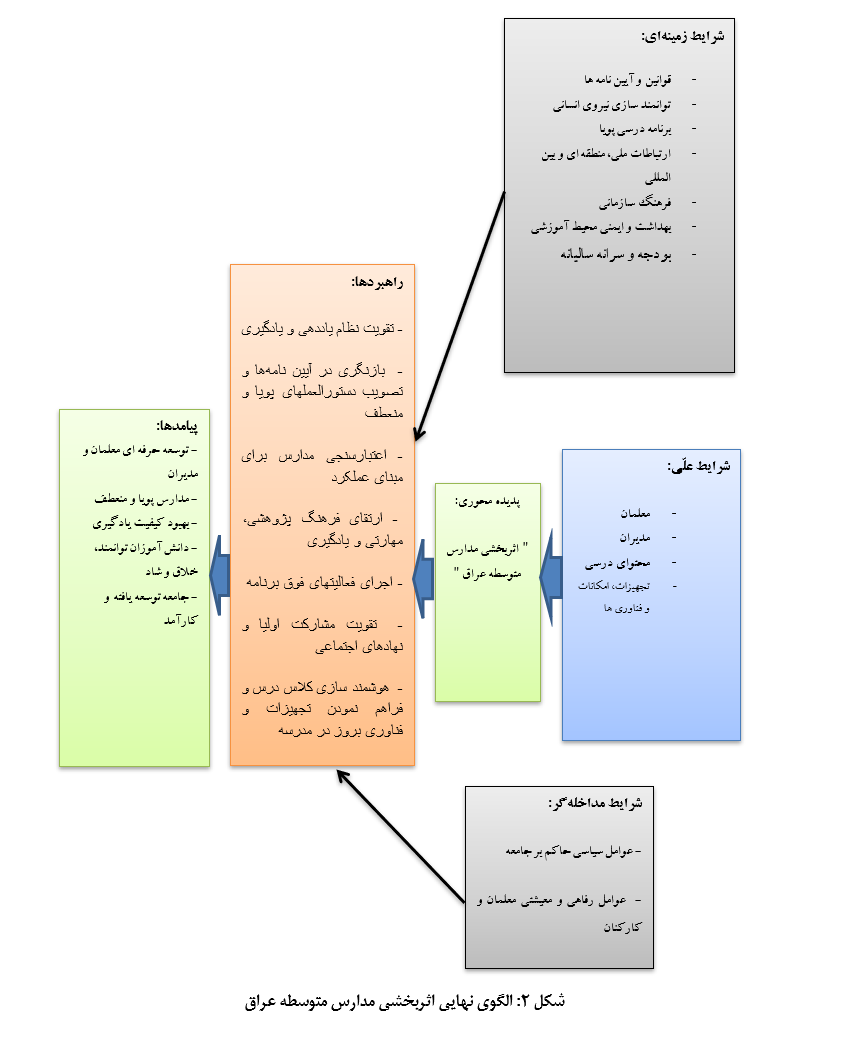Designing a Paradigmatic Model for Effective Schools in the Third Millennium in Iraq: Based on Grounded Theory
Keywords:
effective schools, paradigm model, education in Iraq , third millennium , data base theoryAbstract
This study aims to design a paradigmatic model for effective schools in the third millennium in Iraq. A qualitative approach based on grounded theory was used, with data collected through semi-structured interviews with 10 education experts. Data analysis was conducted using open, axial, and selective coding. The research results led to a paradigmatic model comprising five main components: Causal conditions include teachers, administrators, curriculum content, and equipment and technologies. Contextual conditions cover laws, human resource empowerment, curriculum, communication, organizational culture, health and safety, and budget. Intervening conditions encompass political, welfare, and livelihood factors, parental involvement, and social vulnerabilities. Strategies involve strengthening the teaching-learning system, revising regulations, school accreditation, promoting a research culture, implementing extracurricular activities, community and industry engagement, parental involvement, digitalization, and preventing social vulnerabilities. Outcomes include professional development of teachers and administrators, dynamic and flexible schools, improved learning quality, empowered and creative students, and a developed society. This model can serve as a framework for designing and improving effective schools in the third millennium in Iraq.
Downloads
References
Schleicher A. World class. Paris: OECD Publishing; 2018.
Adesina AE. Perceived impact of primary education on the attainment of Nigeria Vision 2020. Mediterranean Journal
of Social Sciences. 2011;2(5):61-9.
Sulej KC. Human resources development as an element of sustainable HRM with the focus on production engineers.
Journal of Cleaner Production. 2021;278:143.
Muringani J, Fitjar RD, Rodríguez-Pose A. Social capital and economic growth in the regions of Europe. Environment
and Planning A: Economy and Space. 2021.
García-Jiménez J, Torres-Gordillo JJ, Rodríguez-Santero J. Factors Associated with School Effectiveness: Detection
of High- and Low-Efficiency Schools through Hierarchical Linear Models. Educ Sci. 2022;12(59).
Kuhl PK, Lim SS, Guerriero S, van Damme D. How the Science of Learning Is Changing Science Assessment. Paris:
OECD Publishing; 2019.
Ferguson J. A theoretical framework and exploration of organizational effectiveness of schools. Educational
Administration Quarterly. 2017;21(2):117-34.
Ebrahimi Tabar R, Sattari Sa-D, Soleimani T. Designing an Effective Management Model in Third-Millennium
Schools (Case Study of School Principals in Ardabil Province). Sociology of Education. 2023;9(1):137-46.
Kiani F, Zahed Babolan A, Khaleqkhah A, Akbari T. Designing and Validating a Model for a Successful School
Culture. Scientific Journal of Organizational Culture Management. 2022;21(1):41-60.
Shahsavari T, Soleimanpour Omran M, Hafezian M. Validation of the Model of Learning and Teaching Schools in
Education. Scientific-Research Bimonthly on New Approaches in Educational Management. 2021;12(4):53-72.
Ghanbari S, Majouni H. The Impact of Ethical Leadership on Organizational Effectiveness in Schools with the
Mediating Role of Psychological Empowerment and Teacher Creativity. Research on Educational Systems. 2021;15(53):163-
Abedi Koushki S, Amin Bidokhti AA, Zeinabadi HR. Designing a Successful School Management Process Model
Based on Findings from the International ISSPP Study. Education Strategies in Medical Sciences. 2021;15(2).
Kabiri M. Modeling Factors Influencing the Effectiveness of Primary Schools in Tehran, with an Emphasis on Sixth
Grade Mathematics. Journal of Management in Educational Organizations. 2021;11(1):119-36.
Kouhi A, Hashemi A, Minaei A, Dehghan A. The Relationship Between Empowering School Structure, Teacher Job
Satisfaction, and Effectiveness of Primary Schools in Qarchak. Occupational and Organizational Counseling. 2019;11(40):99-
Jafari Rad A, Zahed Babolan A, Moradi M, Samari I. Strategy, Context, and Outcome of Developing Competencies
of Secondary School Principals (Qualitative Study). Scientific-Research Bimonthly on New Approaches in Educational
Management. 2020;11(44):237-62.
Maleki Avaresin S, Soudi H. Designing a Structural-Interpretive Model (ISM) for Effective School Components in
Lower Secondary Education. Journal of School Administration. 2019;7(1):126-46.
Soudi H, Maleki Avaresin S, Talebi B. Developing a Model for Effective Schools in Lower Secondary Education.
Family and Research Quarterly. 2018;16(1):101-26.
Imani J, Bagheri M, Jafari P, Qurchian NQ. Reviewing Components and Indicators of Secondary School Effectiveness
in Hormozgan Province to Present a Model for Improving the Educational System. Educational Leadership Research.
;4(14):25-61.
Urumchi D, Vahdat R, editors. Identifying and Presenting a Suitable Model for an Effective School. International
Congress on Humanities and Cultural Studies; 2016; Tehran.
Fink LD. Creating significant learning experiences: An integrated approach to designing college courses. San
Francisco: Jossey-Bass Publishers; 2019.
Ugochukwu A, Akueyinwa OC, Ndubueze OJ. Effective School Management in Nigerian Secondary Schools: Issues,
Challenges and Way Forward. International Journal of Innovative Research and Advanced Studies. 2021;8(6):34-9.
Pekkolay S. Effective School Management. Journal of Advances in Education and Philosophy. 2021;5(8):231-5.
Chin JM-c, Chuang C-P. The Relationships among School-Based Budgeting, Innovative Management, and School
Effectiveness: A Study on Specialist Schools in Taiwan. Asia-Pacific Education Researcher. 2015;24(4):679-93.
Gray J. Investigating the Role of Collective Trust, Collective Efficacy, and Enabling School Structures on Overall
School Effectiveness. Education Leadership Review. 2016;17(1):114-28.
Alammar L. The Effective School: The Role of the Leaders in School Effectiveness. Educational Research and
Reviews. 2015;10:695-721.

Downloads
Published
Submitted
Revised
Accepted
Issue
Section
License
Copyright (c) 2024 Journal of Study and Innovation in Education and Development

This work is licensed under a Creative Commons Attribution-NonCommercial 4.0 International License.










